Trees surround the ring, as onlookers peer through the branches, hoping to catch sight of the action…
In December, the average temperature is an uncomfortably humid 26°c. There’s no such thing as winter, in Cavite. If there were windows in ‘Survival Camp’, they would be steamy all year round, as the air thickens in the afternoon.
This gym is outdoors, however, with the ring looking as though it’s been dropped in the jungle as a form of emergency boxing relief. I guess, in a way, it has.
The ropes are blue; resembling polypropylene as they strangle all four corners of the squared circle, securing this sacred space. It wasn’t always this ‘official’.
Jerwin Ancajas(30-1-1, 20 KO’s) had travelled a fair distance since his arduous upbringing in Panabo City.
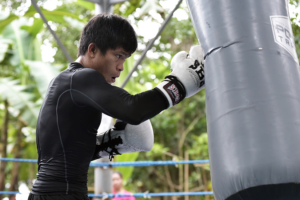
I’d struck up a relationship with the IBF super flyweight World champion following his victory over Northern Irish challenger Jamie Conlan, back in November. I’d stayed in touch with him and his manager, Joven Jimenez, and spoke to the pocket-sized fighter about his road less-travelled, exclusively for Boxing Social.
“My childhood was not easy. I was born in Barangay Togpore, Panabo City [in the Philippines]. We were struggling every day in order to have food on our plates. I remember one day, we only ate a banana, a coconut and root crops for the whole day. The most difficult part of my childhood was when my mother left us. I was only four-years-old at that time and I was forced to work on the farm, together with my father.”
Boxing had often chewed up and spat out success stories borne of absent fathers. Young boys, assuming their role as ‘men of the house’ and re-sculpting their knuckles in pursuit of survival money. It was intriguing to me that Jerwin had experienced the opposite. Lacking that integral, maternal relationship, he had become an employee, forfeiting his role as a child.
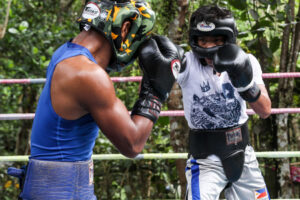
Jerwin opened up on his education, something that seemed split when I had researched the city itself. It has a number of institutes for further education, although many of these are private or ‘international’ schools for the children of expatriates. He explained, “I enrolled in grades one and two [aged six] in school. For me to go to school, I had to walk for four hours, just to reach it.“
He dropped out of education at only nine-years-old, focusing his energy on employment and an amateur boxing career which ended without any outstanding achievements.
“I was eleven years old when then-Congressman Tony Boy Floirendo started a boxing scholarship program and I participated. I aspired, but I was not fortunate enough, to be included in the national boxing team. I stopped [amateur boxing] to turn pro in the year 2009.”
When first talking to Jerwin, I’d been astonished at pictures of their current gym, buried deep in the jungle of Cavite. The ‘ring apron’ was a thin layer of cloth, strewn across a seemingly brick-based square of raised land. The champion stood, leaning against one of the ring posts, gleaming from ear-to-ear.
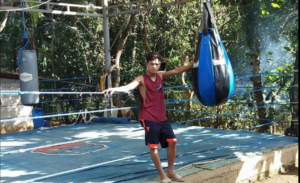
They told me about their previous training locations, including at the side of the motorway, shaded under a crooked mango tree. He’d come a long way since then, especially earning career-high purses in each of his last three fights.
“Back in 2015, we didn’t have a proper gym yet, so our training would be held wherever it was possible to do the exercises – mostly inside the home of my coach Joven or on the streets. I remember thinking that during those times I wanted to train harder and become a better boxer so that I could be a champion one day.”
Ancajas’ coach, the smiling and ever-polite Jimenez, interjected, “We bought this [piece of land] after Jerwin’s fight in Brisbane. We did not have a gym before, we trained on the road, under a mango tree. That’s why myself and Jerwin wanted to have [somewhere of] our own.”
Until the second defence of his IBF world title, Jerwin trained under a tree, by a scorching, dusty roadside. When he seized the crown following his deserved victory over McJoe Arroyo, his reported purse (after sanctioning fees) was a remarkably sparse $2,700 – or £2,048, at-time-of-writing.
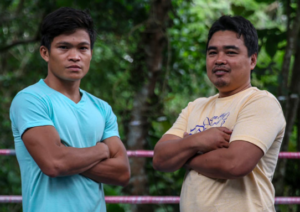
The road less-travelled had been tough and wearing for both Ancajas and Jimenez, but their bond was unshakeable. Forged when both men had nothing but a passion for the sport, they have recently paired with promotional giants Top Rank.
Jerwin raved about the relationship, “I am very grateful for the opportunity to be with Top Rank and to work with Mr Bob Arum. I believe that it will be very good for my career and pave the way for more opportunities in the future. Having the matches in the US has also been truly amazing. I’ve met a lot of new friends and have been given a lot of support, especially from the Filipinos I’ve met there.”
His last contest, facing Jonas Sultan, had made history. The pair faced off in the first ever all-Filipino World title contest, with Ancajas prevailing via wide and unanimous, judges scorecards. I questioned his thoughts post-fight and wondered if he had been satisfied with his performance.
“Jonas Sultan, I have to say that he put up a good fight.” Ancajas told me.
“He was a worthy opponent and gave me a difficult time in the ring. It was evident that he came prepared and had prepared and trained well for our match. I had to step-up my game and focus on outwitting him and also on using my technique and speed.”
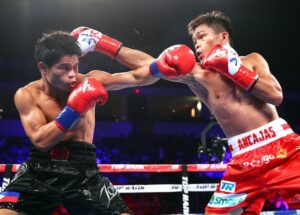
With his last two performances broadcast on US television, Ancajas had drawn a legion of comparisons to fellow Filipino and Top Rank pugilist – Manny Pacquiao.
The relentless pressure applied by both men was typical of boxers from the Philippines, whilst their friendly nature had appealed to a foreign public. Sifting through various articles since my last conversation with Jerwin, I wondered how he’d felt about the constant parallels between himself and the future Hall-of-Fame fighter from Kibawe.
“There would be no Jerwin Ancajas if Sir Manny Pacquiao did not promote my fight with McJoe Arroyo. The promotion to fight Arroyo was a really big help for me, one opportunity I really did strive not to waste. Sir Manny’s counselling to me is also very important. This is why we always give thanks to him.” He continued, predictably lavishing praise on a man worshipped across the West Pacific, “Being compared to Manny Pacquiao is truly an honour. I am very flattered with this comparison, especially since Pacquiao is a world-famous, boxing legend.”
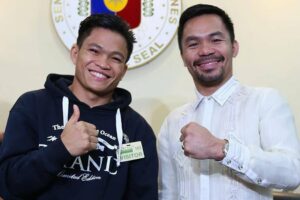
After the success of HBO’s initial ‘SuperFly‘ card, featuring Chocolatito, Sor Rungvisai, Carlos Cuadrado, Juan Estrada and Naoya Inoue, it seemed certain that unifications were on the table. Ancajas, whilst clinging onto his regal, red belt, was determined to snatch a second. He shrugged when asked about opposition, happy to test himself against the best in the division. Britain’s world champion Kal Yafai had been mooted as a possible opponent and Panabo’s ‘Pretty Boy’ seemed willing.
“Yafai is a very good fighter and to be given the chance to go against him will be truly an honour.” he glowed.
“It is the dream of both myself and Coach Joven that I could be able to be given the chance to face the existing champions in my weight category. The other champions at super-flyweight are all good and strong. This is why I strive to be likewise; strong. I know what they can do and they are not ordinary. I would be ready and I would not waste the opportunity [to unify the division].”
From toiling in the farm as a child, to spoiling his own children on their birthdays. From poverty in Panabo City to the People’s Champion. It could be argued that Ancajas has already lived out his wildest dreams. Achieving so much in a career relatively short-lived, propelling himself towards world title unification bouts, viewed by tens of millions.
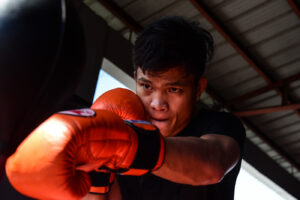
The smiling boy from under the mango tree had seen his potential come to fruition. Whatever follows, seems almost like a bonus.
“For me, it is a big achievement to be a World champion in boxing. My only wish is that my fans would remember me simply as a champion.”
Article by: Craig Scott
You can follow Craig on Twitter at: @craigscott209